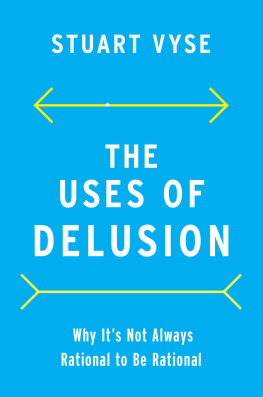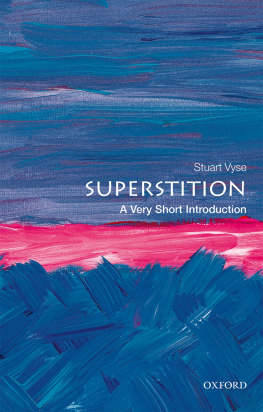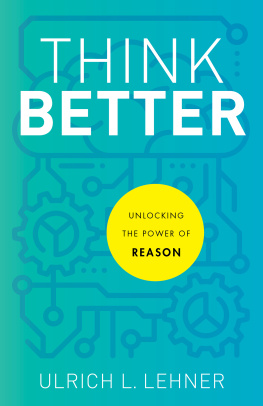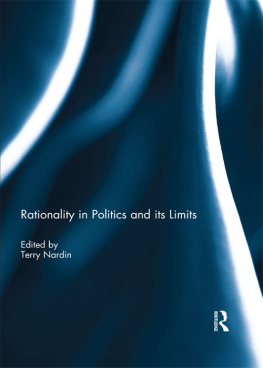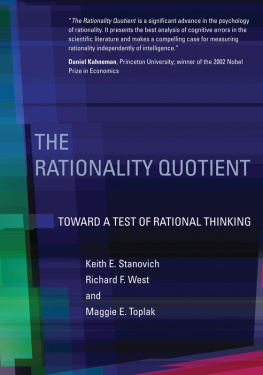The Uses of Delusion

Oxford University Press is a department of the University of Oxford. It furthers the Universitys objective of excellence in research, scholarship, and education by publishing worldwide. Oxford is a registered trade mark of Oxford University Press in the UK and certain other countries.
Published in the United States of America by Oxford University Press
198 Madison Avenue, New York, NY 10016, United States of America.
Stuart Vyse 2022
All rights reserved. No part of this publication may be reproduced, stored in a retrieval system, or transmitted, in any form or by any means, without the prior permission in writing of Oxford University Press, or as expressly permitted by law, by license, or under terms agreed with the appropriate reproduction rights organization. Inquiries concerning reproduction outside the scope of the above should be sent to the Rights Department, Oxford University Press, at the address above.
You must not circulate this work in any other form and you must impose this same condition on any acquirer.
Library of Congress Cataloging-in-Publication Data
Names: Vyse, Stuart, author.
Title: The uses of delusion : why its not always rational to be rational / Stuart Vyse.
Description: New York, NY : Oxford University Press, [2022] |
Includes bibliographical references and index.
Identifiers: LCCN 2021046186 (print) | LCCN 2021046187 (ebook) |
ISBN 9780190079857 (hardback) | ISBN 9780190079871 (epub) |
ISBN 9780197621547 (online)
Subjects: LCSH: Defense mechanisms (Psychology) | Delusions. | Self-deception.
Classification: LCC BF175.5.D44 V97 2022 (print) | LCC BF175.5.D44 (ebook) |
DDC 155.2dc23
LC record available at https://lccn.loc.gov/2021046186
LC ebook record available at https://lccn.loc.gov/2021046187
DOI: 10.1093/oso/9780190079857.001.0001
In honor of
Howard Rachlin and Daniel M. Wegner
Contents
To develop a thoughts meaning we need only determine what conduct it is fitted to produce; that conduct is for us its sole significance.
William James, The Pragmatic Method
In 1972, as I was starting graduate school, a friend died in a car accident. He was a troubled man, a Vietnam veteran who never quite settled into life after returning home from the war. Late at night while his wife Susan slept in their bed, his car crashed into a tree many miles away from where he should have been.
In the weeks that followed, a group of us spent a lot of time with Susan. We took her out and taught her how to get drunk. We hugged her. We tried to make sure she was with other people as much as possible.
Susan worked in the university library. Her desk was at a window seven floors up, and before her husband died, at the end of each day, she would see him down below, walking to the library to pick her up from work. Catching sight of him was her signal to put away her things and go home.
One evening, months after his death, Susan told me that she still looked down to the street near the end of each day, expecting to see her husband walking toward the library. It wasnt just a habit. She was unwilling to accept that this man who survived a war had somehow slipped away from her once he was safely back home.
Sometimes I think hes just going to walk through a door, she said.
There are times when we need a little delusion in our lives, and death is often one of those times. In her memoir The Year of Magical Thinking, Joan Didion described her experience of mourning the sudden death of her husband:
On most surface levels I was rational. To the average observer I would have appeared to fully understand that death was irreversible. I had authorized
Yet Didion insisted on spending the first night after her husbands death alone, so that he could come back. Bringing her husband back became the focus of the next several months, during which she kept his shoes in the closetbecause he would need them when he returned.
To me, one of the most endearing of all human characteristics is our propensity for paradoxical behavior. There is little doubt that we are the most intelligent species this planet has produced, and yet, on an hourly basis, completely normal people do things they know full well they probably shouldnt do. Others cling to ideas that they have good reason to believe are false. Often, we have complete awareness of our inconsistencies: I know I probably shouldnt do this, but I cant help it. Im going to do it anyway. In contrast, other species seem enviably free of these conflicts. Dogs and cats do things that seem utterly crazy to us, but their commitment to the project is complete and uncomplicated. They dont give it a second thought.
This book is about some of these human paradoxes. It is about beliefs we cling to and actions we take that dont entirely make senseparadoxes that are, nonetheless, quite valuable because they help us survive difficult times, navigate the social world around us, and achieve our personal goals.
Like Didion, I am a rationalist most of the time. I am a behavioral scientist who has published research on the psychology of superstition and belief in astrology, and I write the Behavior & Belief column for Skeptical Inquirer, a magazine for science and reason. Ive spent much of my career promoting the idea that logic and evidence should be our guides. I believe our capacity for reason has been essential to all of our greatest achievements and, if humanity is to survive, we will need reason and evidence to get us through. But slowly, over a period of many years, I have come to a more nuanced understanding of truth and illusion. Human beings are often biased, superstitious, and irrational, and usually these characteristics are flies in the ointment. Most of the time we should throw off our delusions and strive for rationality if we hope to perform at our best. However, this book is about the other times: times when we cannotor should notdiscard our delusions.
Useful delusions come in several varieties. Some of them seem to be built in at the factory, as much a part of us as our teeth and bones. In that regard they share an affinity with perceptual illusions. Mller-Lyer illusion. As anyone who has taken an introductory psychology course can tell you, the two vertical lines are the same length. I created this graphic on my computer, and I made the line on the right by duplicating the one on the left. So, I know they are exactly the same length. If you are unconvinced, I encourage you to make your own measurements.

Figure 1.1 The Mller-Lyer illusion.
Despite the evidence, to most people, the line on the left looks longer than the one on the right. The most common explanation for the illusion is that, for those of us who have grown up around boxes and cubes, the figure on the left looks like the inside corner of a cube that is a bit farther away from us, and the one on the right looks like the outside corner of a cube that is pointed toward us. Finally, in judging the size of objects, our brain makes an adjustment for their distance from us, boosting the apparent size of far-away objects. This calculation keeps us from mistaking a distant oncoming car for a toy car. Therefore, according to the common depth-perception explanation for the Mller-Lyer illusion, the line on the left looks longer because it appears to be farther away.

